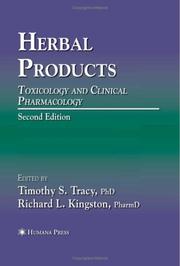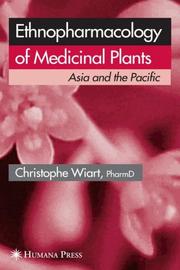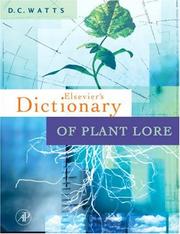| Listing 1 - 10 of 123 | << page >> |
Sort by
|
Book
ISBN: 0443100942 0702036765 9780702036767 9780443100949 Year: 2009 Publisher: Edinburgh ; New York : Churchill Livingstone,
Abstract | Keywords | Export | Availability | Bookmark
 Loading...
Loading...Choose an application
- Reference Manager
- EndNote
- RefWorks (Direct export to RefWorks)
Materia medica, Vegetable --- Medicine, Chinese --- Botanical drugs --- Drugs from plants --- Medicinal plants --- Phytotherapy --- Plant drugs --- Vegetable drugs --- Materia medica --- Botanical drug industry --- Botany, Medical --- Therapeutic use
Book
ISBN: 1536120006 9781536120004 9781536119770 Year: 2017 Publisher: New York : Nova Science Publishers,
Abstract | Keywords | Export | Availability | Bookmark
 Loading...
Loading...Choose an application
- Reference Manager
- EndNote
- RefWorks (Direct export to RefWorks)
Materia medica, Vegetable. --- Botanical drugs --- Drugs from plants --- Medicinal plants --- Phytotherapy --- Plant drugs --- Vegetable drugs --- Materia medica --- Botanical drug industry --- Botany, Medical --- Therapeutic use
Book
Abstract | Keywords | Export | Availability | Bookmark
 Loading...
Loading...Choose an application
- Reference Manager
- EndNote
- RefWorks (Direct export to RefWorks)
Materia medica, Vegetable. --- Botanical drugs --- Drugs from plants --- Medicinal plants --- Phytotherapy --- Plant drugs --- Vegetable drugs --- Materia medica --- Botanical drug industry --- Botany, Medical --- Therapeutic use
Book
ISBN: 1803560215 1803560207 Year: 2022 Publisher: London, United Kingdom : IntechOpen,
Abstract | Keywords | Export | Availability | Bookmark
 Loading...
Loading...Choose an application
- Reference Manager
- EndNote
- RefWorks (Direct export to RefWorks)
Materia medica, Vegetable. --- Botanical drugs --- Drugs from plants --- Medicinal plants --- Phytotherapy --- Plant drugs --- Vegetable drugs --- Materia medica --- Botanical drug industry --- Botany, Medical --- Therapeutic use
Book
ISBN: 9811658919 9811658927 Year: 2022 Publisher: Singapore : Springer,
Abstract | Keywords | Export | Availability | Bookmark
 Loading...
Loading...Choose an application
- Reference Manager
- EndNote
- RefWorks (Direct export to RefWorks)
Materia medica, Vegetable. --- Botanical drugs --- Drugs from plants --- Medicinal plants --- Phytotherapy --- Plant drugs --- Vegetable drugs --- Materia medica --- Botanical drug industry --- Botany, Medical --- Therapeutic use

ISBN: 1280971835 9786610971831 1597453838 1588293130 Year: 2007 Publisher: Totowa, N.J. : Humana Press,
Abstract | Keywords | Export | Availability | Bookmark
 Loading...
Loading...Choose an application
- Reference Manager
- EndNote
- RefWorks (Direct export to RefWorks)
Herbal Products: Toxicology and Clinical Pharmacology, Second Edition builds upon the informative foundation laid by its predecessor. This fully revised and expanded second edition boasts over 200 new references that document efficacy studies and adverse effects and four new chapters devoted to dietary products. Practitioners and researchers will find that this volume is a comprehensive resource for objective clinical information about the potential uses, efficacy, and safety of herbal medicines. The authors recognize that the majority of available information on dietary supplements is typically provided by distributors and designed to sell a product rather than objectively inform consumers; therefore, the emphasis throughout is on information not readily available from any other source. Similar to the first edition, this volume is based on original studies published in peer-reviewed journals, as well as meta-analyses, systematic reviews, and other high-quality assessments by recognized experts.
Herbs --- Materia medica, Vegetable --- Toxicology. --- Botanical drugs --- Drugs from plants --- Medicinal plants --- Phytotherapy --- Plant drugs --- Vegetable drugs --- Materia medica --- Botanical drug industry --- Botany, Medical --- Plants, Useful --- Forbs --- Therapeutic use
Book
ISBN: 0272004677 9780272004678 Year: 1977 Publisher: Kent: Pitman Medical,
Abstract | Keywords | Export | Availability | Bookmark
 Loading...
Loading...Choose an application
- Reference Manager
- EndNote
- RefWorks (Direct export to RefWorks)
Materia medica, Vegetable --- Herbicides --- Herbicides. --- Materia medica, Vegetable. --- Pharmacognosy. --- Plants, Medicinal. --- Botanical drugs --- Drugs from plants --- Medicinal plants --- Phytotherapy --- Plant drugs --- Vegetable drugs --- Materia medica --- Botanical drug industry --- Botany, Medical --- Herbicide --- Weed killers --- Weedicides --- Pesticides --- Weeds --- Therapeutic use --- Control

ISBN: 1588297489 9786610832477 1280832479 1597451606 Year: 2006 Publisher: Totowa, N.J. : Humana Press,
Abstract | Keywords | Export | Availability | Bookmark
 Loading...
Loading...Choose an application
- Reference Manager
- EndNote
- RefWorks (Direct export to RefWorks)
In 1860, Oliver Wendell Holmes pointedly expressed himself to the Massachusetts Medical Society: “I firmly believe that if the whole Material Medica, as now used, could be sunk to the bottom of the sea, it would be all the better for mankind, and all the worst for the fishes.” Should one think the same about the current approach in drug discovery from plants? Probably yes. Despite the spending of billions of US dollars, and three decades of efforts, high-throughput screenings have only allowed the discovery of a couple of drugs. One could have reasonably expected the discovery of an arsenal of drugs from the millions of plant extracts randomly tested, but “hits” can be inactive in vitro or too toxic, some molecules need to be metabolized first to be active, and false-positive and false-negative results are common. The bitter truth is that the robotic approach in discovering drugs from plants has proven, to date, its inability to excavate the hundreds of molecules that will contribute to the health progress of Man. However, one can reasonably see that the last patches of primary rainforest on earth hold still hundreds of spectacularly active drugs that await discovery.
Materia medica, Vegetable --- Ethnopharmacology --- Indigenous peoples --- Botanical drugs --- Drugs from plants --- Medicinal plants --- Phytotherapy --- Plant drugs --- Vegetable drugs --- Therapeutic use --- Pharmacy. --- Pharmacology. --- Pharmacology/Toxicology. --- Ethnoscience --- Pharmacology --- Traditional medicine --- Materia medica --- Botanical drug industry --- Botany, Medical
Book
ISBN: 0081021046 0081020813 9780081021040 9780081020814 Year: 2018 Publisher: Amsterdam, Netherlands ; Kidlington, England ; Cambridge, Massachusetts : Elsevier,
Abstract | Keywords | Export | Availability | Bookmark
 Loading...
Loading...Choose an application
- Reference Manager
- EndNote
- RefWorks (Direct export to RefWorks)
Materia medica, Vegetable. --- Herbs --- Therapeutic use. --- Herb remedies --- Herbal medicine --- Medicinal herbs --- Botanical drugs --- Drugs from plants --- Medicinal plants --- Phytotherapy --- Plant drugs --- Vegetable drugs --- Materia medica --- Botanical drug industry --- Botany, Medical --- Therapeutic use

ISBN: 1281037710 9786611037710 0080546021 9780080546025 012374086X 9780123740861 9781281037718 6611037713 Year: 2007 Publisher: Amsterdam ; Boston : Elsevier/AP,
Abstract | Keywords | Export | Availability | Bookmark
 Loading...
Loading...Choose an application
- Reference Manager
- EndNote
- RefWorks (Direct export to RefWorks)
Knowledge of plant names can give insight into largely forgotten beliefs. For example, the common red poppy is known as ""Blind Man"" due to an old superstitious belief that if the poppy were put to the eyes it would cause blindness. Many plant names derived from superstition, folk lore, or primal beliefs. Other names are purely descriptive and can serve to explain the meaning of the botanical name. For example, Beauty-Berry is the name given to the American shrub that belongs to the genus Callicarpa. Callicarpa is Greek for beautiful fruit.
Materia medica, Vegetable --- Plant names, Popular --- Plants --- Flora --- Plant kingdom --- Plantae --- Vascular plants --- Vegetable kingdom --- Vegetation --- Wildlife --- Organisms --- Botany --- Botanical drugs --- Drugs from plants --- Medicinal plants --- Phytotherapy --- Plant drugs --- Vegetable drugs --- Materia medica --- Botanical drug industry --- Botany, Medical --- Therapeutic use
| Listing 1 - 10 of 123 | << page >> |
Sort by
|

 Search
Search Feedback
Feedback About UniCat
About UniCat  Help
Help News
News